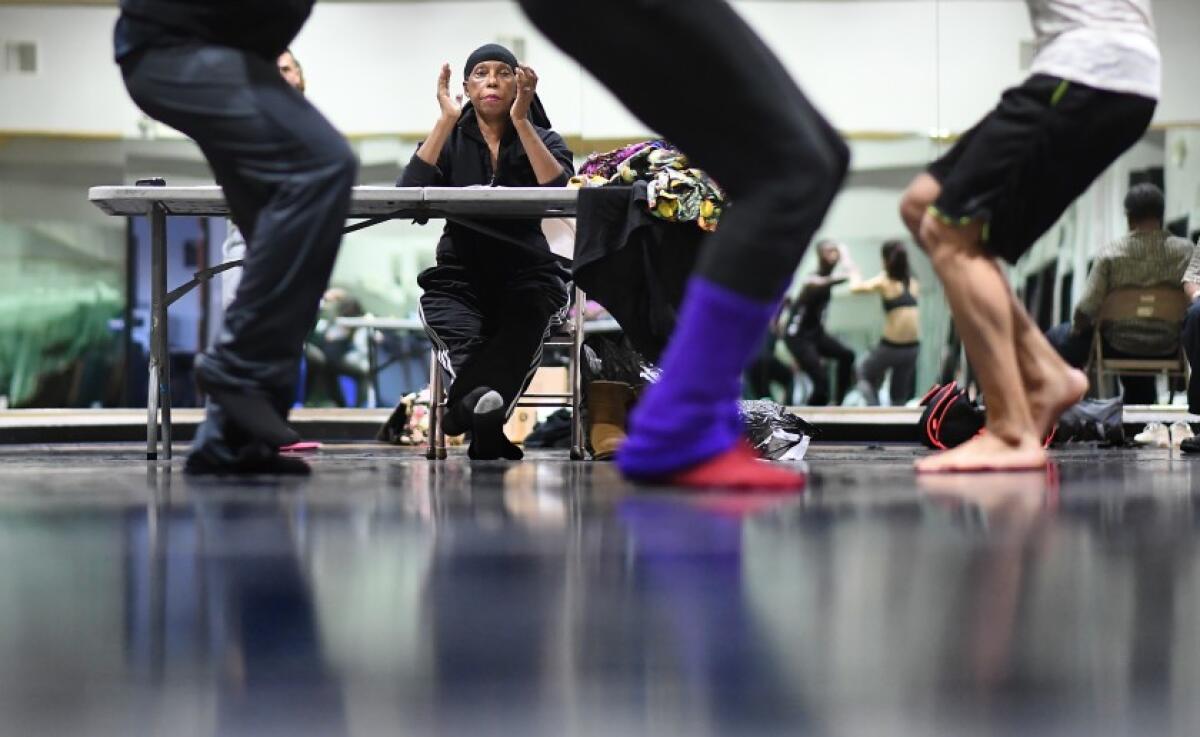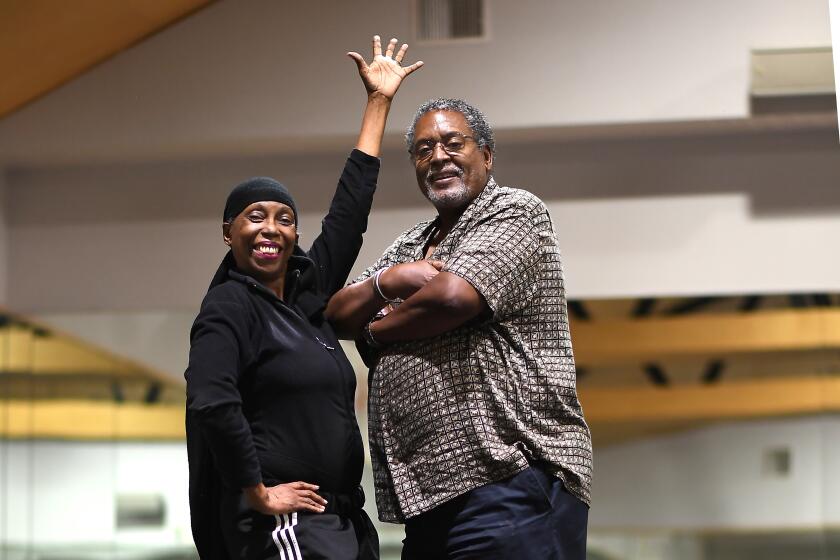How a $970,000 award represents hope and change for a Black L.A. dance company

- Share via
As COVID-19 continues to wreak havoc on the arts, a $970,000 grant from the Andrew W. Mellon Foundation has become a ray of hope for L.A.-based Lula Washington Dance Theatre and signals a breakthrough for a Black arts group historically passed over for foundation funding of this magnitude.
The Mellon award is the second-largest in the company’s 40-year history, said Executive Director Erwin Washington, who worked on the grant application throughout 2020 and received news of the award in December. It’s second only to the $1.3 million that came from the Federal Emergency Management Agency after the 1994 Northridge earthquake destroyed the company’s building.
This level of funding “has been a long time coming,” Artistic Director Lula Washington said. “We were hoping that foundations like the Mellon would understand and appreciate what we do here in the Black community, and what our purpose is here, why we are important, why we need to survive.”
The wife-husband duo began the company in 1980, borrowing money for rehearsal space and using costumes from Lula’s closet. The company has become a cultural force, presenting work about the Black experience locally, nationally and abroad even as it struggled to stay afloat.
In the past, Lula said, “in the funding systems, this opportunity was not forthcoming, even though we would apply for funding, we were denied it. But we are grateful that they took the time to talk to us, to study us, to speak to other people who knew of us, to learn what our significant role is in our community.”
Lula and Erwin Washington married in 1970 and founded Lula Washington Dance Theatre in 1980. They vow to keep on, “even if it’s just the two of us.”
Local performing arts groups of color have long complained about historical funding models, which perpetuate bias by prioritizing organizations with budgets of more than $5 million. Without this kind of major funding, these groups have said growth, or even survival, is much more difficult.
The Mellon award for Lula Washington comes at a crucial time, as the pandemic forced the company to cancel its national tour last year, reduce the size of its company, scale back youth classes and go virtual. One lifesaver, Erwin said, was owning the building on Crenshaw Boulevard — a purchase made possible by the FEMA grant. Another significant win, Lula and Erwin said, was a $150,000 grant from L.A. County Supervisor Mark Ridley-Thomas to buy an outdoor stage and pay for free, socially-distanced classes for children in the community.
Distributed over four years, the Mellon award will support several efforts.
The funding will cover facility upgrades and allow the company to double dancers’ weekly pay, as well as begin creating new works for when audiences can convene. The company will work to produce a future home season, a series of performances in the L.A. area.
The company will hire four entry-level arts administrators: a development assistant to manage relationships with donors; a booking assistant to help secure performances across the state, nationwide and abroad; a bookkeeper to help with accounting and financial management; and a marketing assistant to help with web development, the company’s social media presence and publicity.
Historically, Erwin and Lula did many of these jobs alone. “That’s always been an area where we’ve been stressed,” Erwin said.
The idea is to continue fundraising and keep at least two administrators on staff permanently after the grant period. By then, the administrators might be promoted to director level.
A $50,000 board-designated working capital reserve fund will further diversify fundraising and help expand the reach of Lula Washington Dance Theatre in L.A. and on tour. The board “can’t spend any of that money unless they have already identified another source of money that will replenish the fund,” Erwin said.
The grant also will help with the inevitable transition of leadership to the couple’s daughter, Tamica Washington-Miller, a choreographer and the company’s associate director.
“We’ve reached a certain age,” said Erwin, who is 70. “We never know when she may have to step up into more of (a) leadership position depending on our health. There are no problems, but we just want to be ready.”
The couple also wants to ensure their daughter is properly supported.
“Lula and I for the last 40 years, each carried such a big load. We both do many, many jobs,” Erwin said. “We just don’t want the next generation of leadership to have to do that many jobs.”
The Mellon grant is part of the foundation’s Comprehensive Organizational Health Initiative, a program launched in 2015 to help underserved arts and cultural institutions move from survival to sustainability. The initiative is intended to disrupt the cycle of systemic inequality in the funding world, said Mellon program director for arts and culture Emil Kang. Over five years, the initiative has given $33 million to regional art conservation centers, theater and performance groups that are part of the National Performance Network and members of the International Assn. of Blacks in Dance.
“It fully acknowledges that in many cases, achieving financial strength and stability, while is a top concern for most nonprofits, continues to be out of reach for many organizations, especially those that are led by or serving people of color,” Kang said.
A 2017 study by Helicon Collaborative examining inequity in U.S. arts funding found that only 2% of cultural institutions (those with budgets of more than $5 million) receive close to 60% of all contributed revenue, including foundation and individual giving. And just 4% of all foundation arts funding is allocated to organizations whose primary mission is to serve communities of color.
In 2019, Lula Washington Dance Theatre had an operating budget of about $750,000. The pandemic decreased the 2020 budget to about $550,000.
Erwin recalled applying for a number of national grants over the years and being told the company didn’t have enough infrastructure to be considered a competitive applicant.
“I don’t want to name any of the foundations,” Erwin said. “But when they would find out, for instance, that our dancers aren’t on year-round contracts, then that basically made us unfundable. And when they find out that our staff is so small, we don’t have a full staff, we became less competitive for those national grants.”
Mellon partnered with the International Assn. of Blacks in Dance, a network created in 1988 to connect Black dancemakers, administrators and performers. Five founding IABD members received substantial “change capital grants” based on operating budget in 2019 and 2020, Kang said: Lula Washington Dance Theatre, Cleo Parker Robinson Dance in Colorado ($850,000), Dayton Contemporary Dance Company in Ohio ($771,000), Dallas Black Dance Theatre ($824,000) and the Philadelphia Dance Company ($420,000).
IABD’s participation in the Mellon program also allowed the network to redistribute more modest grants to 25 member organizations in 2018 and 2019.
The ideal outcome is for a dance company to increase its budget and become stronger on an administrative, artistic and operational level, helping the company secure additional funding, “so our group can sustain itself going forward into the future,” Erwin said.
For the foundation, the award represents an opportunity to shine a light on the company, said Kang. “And onto humans like Lula and Erwin, who’ve been doing this for so long with so little that other funders — both private foundation funders, individuals — will actually start to support these organizations.”
More to Read
The biggest entertainment stories
Get our big stories about Hollywood, film, television, music, arts, culture and more right in your inbox as soon as they publish.
You may occasionally receive promotional content from the Los Angeles Times.












